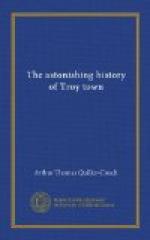“Well, sir, we was driven at last to singin’ a hymn to keep our speerits up. Leastways, the boy an’ me sang, an’ Joe beat time. Then says Joe, ’Look ‘ere, I’m a-goin’ to allee-couchee ef et lasts like this.’ ‘Well,’ I says, for I was gettin’ desprit, ’have ’ee ever tried to make poetry?’ ‘No,’ says he, ‘can’t say I have.’ ‘Well,’ I says, ‘I’ve oft’n wanted to. Let’s ha’ a shy. You go aft and think of a verse, an’ I’ll go forra’d an’ make another, an’ then us’ll see which sounds best.’ ‘Done,’ says he, an’ off he goes.
“Well, I sits there for mor’n an hour, thinkin’ hard, and terrable work I found et. At last Joe shouts across, ’Hav’ee done? Time’s up’; and I told ‘un I’d done purty middlin’. So us stepped amidships, and spoke out what us had made.”
Caleb made a long pause.
“I should like to hear the verses, if you remember them,” said Mr. Fogo.
“Should ’ee now?” Caleb asked with fine modesty. “Well, I don’t mind, on’y you mus’n’ expect ’em to be like Maister Moggridge’s. Mine went thicky way.” He recited very slowly, with a terrific rolling of syllables:—
“See her glidin’
dro’ the water,
Far,
far away!
Many a true heart’s
niver to be found.
“The last line alludes to my gal wot had recently e-loped wi’ the Rooshan,” Caleb explained.
“Was that all?”
“That was all o’ mine, sir, but Joe’s was p’ints better. Just listen:—”
“Fare thee well, Barnstaple steeple,—”
“(He was a Barnstaple man, sir, was Joe)—”
“Fare thee well,
I say,
Never
shall I see thee, once agen, a long time ago.”
“Well, sir, we was just a-goin’ to step back an’ have another shy, when the breeze sprang up a’most as sudden as et fell, and the consikence es, sir, that I’ve niver made no more poetry from that day to this.”
The sun was getting low, as Mr. Fogo and Caleb stepped ashore on the ruined quay at Kit’s House, not far from the spit of land where the lazars were buried. Kit’s Cottage stood plain to see at a short distance from the water, but Kit’s House lay to the right, behind its screen of laurels and elms. A narrow flight of steps and a path along the cliff’s edge brought the visitors to the front door.
It was a long, low house, with pointed windows on the upper storey, and a deep verandah shading the ground-floor rooms. It faced the south, and although few flowers were out, the ruined garden was luxuriant with decay. One could see where the old Lazar-house had been overlaid with the taste of more recent inhabitants, but, as Caleb said, no one had lived here now for a dozen years or more. The walls were smeared with green vegetation; the iron gate creaked heavily with rust. On the roof the stonecrop flourished, and the swallows had built their nests about the chimneys.
Indoors it was as bad. Rich papers hung and rotted from the walls; rats scampered about the floors overhead; a smell of damp and mouldiness pervaded every room.




